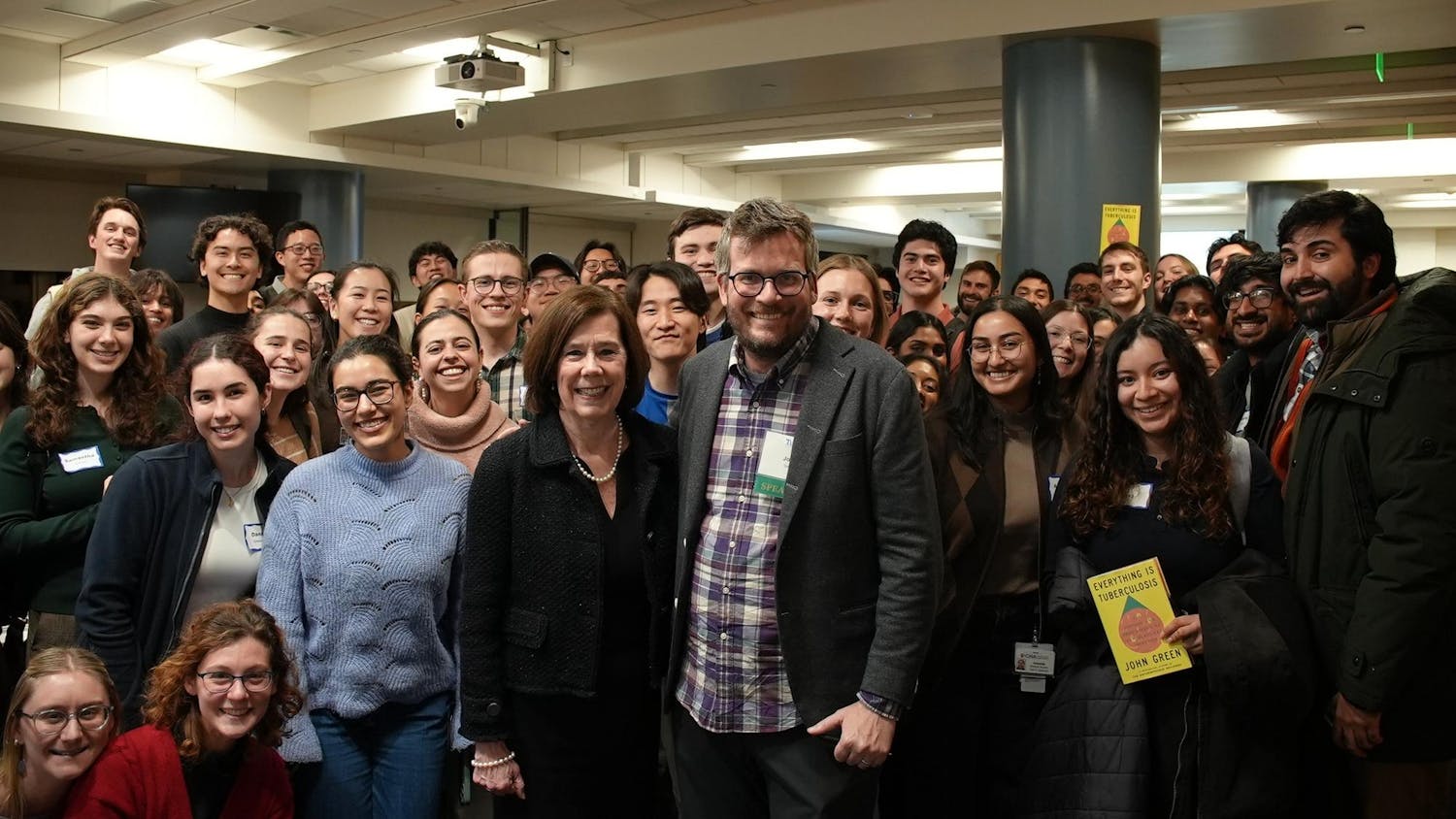Activist, advocate, fighter. There are many words one could use to describe Heather Booth. However, the one term that perfectly describes her career as a strategist for over 65 campaigns and life of activism is “organizer.”
At the age of 71, Boothhas spent over 50 years fighting for several progressive causes ranging from civil rights to reproduction rights, to immigrants rights and many other issues in between. Time and time again she has illustrated that the power of organizing — rather than simply protesting — brings change. She brought her story and message about organizing to a roundtable discussion hosted by the Jonathan M. Tisch College for Civic Lifeand co-sponsored by a number of Tufts organizations. Entitled "How Can We Lead Social Change?," the event was held in the Laminan Lounge on Nov. 13.
“I came to Tufts because it’s a seat of important education, learning and activism," Booth said. "The students here are part of a new generation that will build a better society and I wanted to engage with them. I wanted to meet the students and learn their concerns, I wanted to share how meaningful it is to have a life in organizing, and I wanted to encourage them to organize, to build power and move it in the elections so that we can win."
Booth’s legacy is one that began when she was a teenager attending The University of Chicago. She joined the civil rights movement in Mississippi with other students from Northern universities as part of the Freedom Summer Project, according to a University of Chicago feature article.
“In 1964, black lives did not matter in Mississippi," Booth said. "But because there was organizing and not just protest — there were people going door-to-door and talking to people so the base itself was built — there was a voting rights act within a year."
Booth shared several stories of her experiences that led to her life in organizing. When a friend of hers was raped at knifepoint, only to be given a lecture about promiscuity from her university's health services and told that student health didn’t cover gynecological exams, Booth continued her fight. Inspired by her previous civil rights work, she organized a sit-in for women's health coverage. Due in part to this organizing, college women can now receive gynecological coverage and supportive units for rape.
“Back then when you organized, people had to answer the question, 'Are you willing to die for freedom?' I think the question now is not are you willing to die for freedom, but really are you willing to live for freedom, justice and respect for all? Are you willing to do the work every day? Calling people. Knocking on doors. Passing out flyers. Coming to events like this. Spreading the message. I’ve tried many other things in my life, and I’ve never found anything as satisfying and inspiring,” Booth said.
Booth also contributed to efforts for a woman’s right to choose. Another one of her friends discovered she was pregnant and became suicidal because she knew she wasn’t ready to have a child. This predicament and the lack of options for women in her situation lead to the formation of the Jane Collective, a system that allowed 11,000 women to receive abortions between 1965 and 1973, according to Booth.
Along with being a founding director of the NAACP National Voter Fund, the director of Americans for Financial Reform, a training director for the Democratic Party and the founding director of a training center in Chicago called Midwest Academy among various other leadership positions described in her bio for the Midwest Academy, she also worked with U.S. Senator Elizabeth Warren to pass the Dodd-Frank Act, according to a July 28 Huffington Post article.
“I had been skeptical about elections until 1980. I worked in Mississippi. Both parties seemed not to care about what real people care about," Booth said. "Then, in 1980 I realized how you can use elections to build organization and use organization to build elections back and forth."
It was in Tampa where she met and worked closely with Tufts junior and transfer student Wylie Chang, who organized the entire event when he discovered that she would be in the Boston area.
“Heather and I worked for a campaign to combat voter suppression. We just kept in touch so closely the past year, and she’s just been a really great mentor and friend since," Chang said. "She was in town because there’s a documentary that was made about her this past year, and it’s being screened all across the country. Since she was already in Boston, she said she’d be happy to drop by Tufts."
The event, which preceded an on-campus screening of a new documentary based on her life called “Heather Booth: Changing the World,” was intended to be a roundtable discussion with students rather than simply a lecture.
“We ultimately wanted to have a discussion about these issues because a lot of Tufts students care about these issues and Heather would be happy to be supportive of a lot of efforts," Chang said. "I was amazed by Heather’s ability to create a conversation. It felt like a conversation just by the fact that there were like 50 people here, but she was able to make it feel like people were heard. She even asked the opinion of President Monaco, which he gave. That’s something that I’ve never seen happen before and I really appreciated."
Students were able to talk with Booth before the roundtable discussion and converse then receive feedback about their own social justice endeavors in a relatively small, quiet setting.
"One of the things I really admire about Heather is that she doesn’t really look down on people who are coming into the movement or are not there yet, and in planning this event, I wanted to make it clear, too, that it doesn’t matter to me if they were passionate organizers already or just curious," Chang said. "Our own passion for issues doesn’t necessarily bring people into the movements. It takes care and it takes kindness and patience to do that, and I think that’s probably the greatest thing I’ve seen Heather model through life."
The hour-long event successfully stimulated a variety of conversations that ranged from discussion about short term versus long term organizational goals to the debate surrounding the possible arrival of Ben Shapiro to the Tufts campus.
“It is just wonderful to have people like Heather Booth come to Tufts because of our commitment to civic life and being able to have people that have had long experiences in that to share that with students who are at the beginning of their civic life," University President Anthony Monaco said. "I think the number of students involved in politics or social justice being able to learn about her experiences in a range of different organizations and what she learned was really valuable to everyone."
When it comes to today's political climate and the mission of student activists working for a more just system, Booth hopes that they consider the significance of organizing in their work
“This is a moment that many describe as a moment of resistance, and I think that’s what’s needed. I’m fully for the resistance, but it’s beyond resistance that I think we need to also consider," Booth said. "If I could send one message to college students today, it would be: If we organize, we can change the world.”
CORRECTION: A previous version of this article noted that Wylie Chang is a sophomore. However, Chang is actually a junior. The article has been updated to reflect this change. The Daily regrets this error.
Longtime activist Heather Booth teaches Tufts how to organize

Students join Heather Booth at the Laminan Lounge to discuss organizing for social change on Nov. 13.





